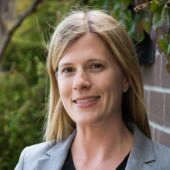Alumni Profile: Kirsten James (WCAS '00)
Prioritizing the Value of Water
Sustainable financing and risk planning strategy in the private sector often focuses on climate risk—and rightfully so. Yet forging a climate-secure future will need to have a broader focus that includes protecting water resources, according to Northwestern environmental science alumna Kirsten James (WCAS ’00). In a world where many in the sustainability field are focused on electrification and extreme weather events, too few have made water their defining issue. James, a senior program director focusing on water at Ceres, is a catalyzer changing that reality within her day-to-day work. 
Ceres, a nonprofit organization based in Boston, was founded in 1989 in response to the Exxon Valdez oil spill. The disaster polluted more than 1,300 miles of shoreline in Alaska’s Prince William Sound that are still being cleaned up to this day. Ceres’s current sustainability advocacy mission takes the form of finance; the organization focuses on driving equitable market-based and policy solutions to combat sustainability issues.
Recent research, including some by James’ team, has highlighted that swift action from investors, corporations, and government is necessary to solidify a sustainable water future. Without significant efforts, the world will struggle to satisfy 56% of its overall water requirements by 2030. The water sustainability expert has built her career around the issue. Alongside Ceres’s leadership, she leads efforts to mobilize key players in financial markets to prioritize efficient water resource management as a core business principle with the goal of preserving global freshwater resources for future generations.
At Ceres, James is primarily focused on leading the two-year-old Value Water Finance Initiative, which engages nearly 100 institutional investors with a combined asset management worth 17.5 trillion dollars to ensure the private sector values and acts on water as a financial risk. She counts the program as one of her greatest career milestones thus far.
“We started with a goal of 30 investors, and now here we are today with nearly 100,” James said. “It took a lot of work to elevate the issue of water risk, but the power the investors have to create change is huge. We’re starting to get more traction with [the financial sector] seeing that we have a water crisis on our doorstep.”
With James’s and her team’s support, investors urge large corporations to improve their water resource management practices. In her current role, she offers technical expertise to help investors drive this change and oversees research projects, such as benchmark analyses that assess companies' water stewardship performance to mitigate the financial risks associated with water scarcity and pollution.
Working in tandem with the private sector has proven to be an integral part of the job, yet it can fly in the face of common misconceptions that label industry players as only “bad actors.” James credits private sector progress as a key factor for overall advancement of water security globally.
“Sometimes, those working on sustainability issues think of the private sector as only an adversary. Yes, the private sector is significantly impacting resources, but we really see them as also being part of the solution and a necessary player to engage with to drive the change we're looking for,” James said. “They need to be at the table. There are a lot of important efforts happening in the private sector to help manage our resources.”
Studying environmental science at Northwestern sparked James’s initial interest in sustainability as both an academic area and future career path. Her time on campus and with her professors led to formative opportunities to take that curiosity beyond the classroom through internships at the US Environmental Protection Agency and during her honors thesis project, where she focused on contamination of the Great Lakes. Her advice for future sustainability professionals? Keep an open mind.
“I absolutely encourage students to explore nonprofit organizations,” James said, “I tried out the private sector briefly, and I worked in government, both federal and state. I've really found my sweet spot in the nonprofit sector. I think it's a place where you can really make a difference.”
